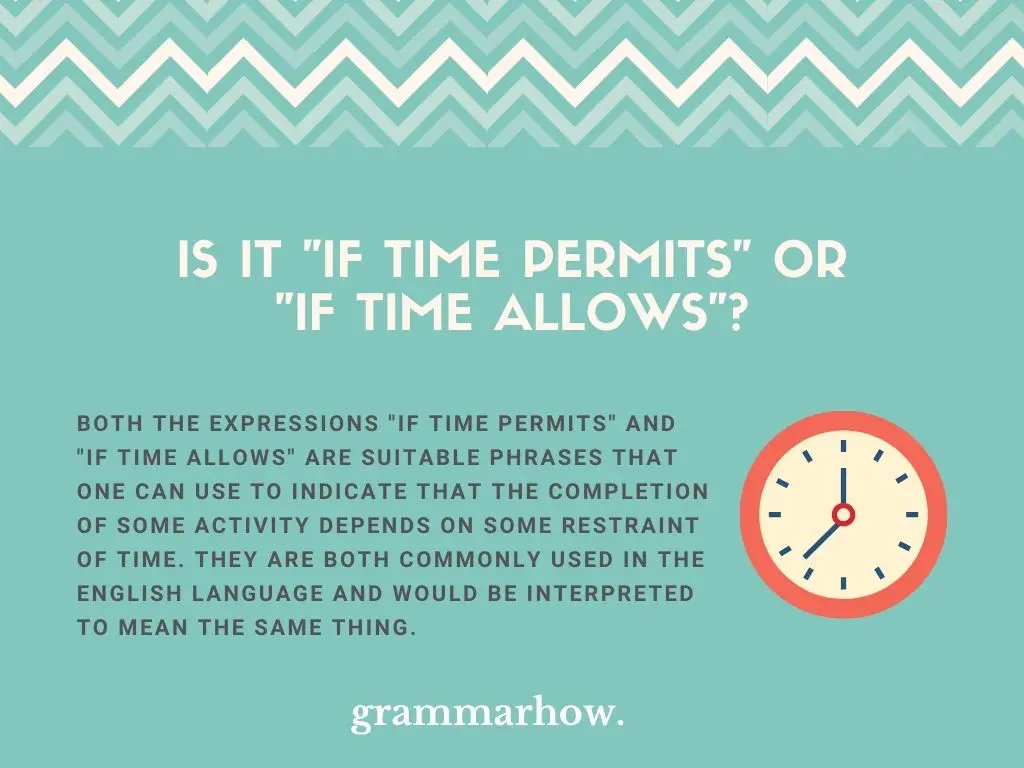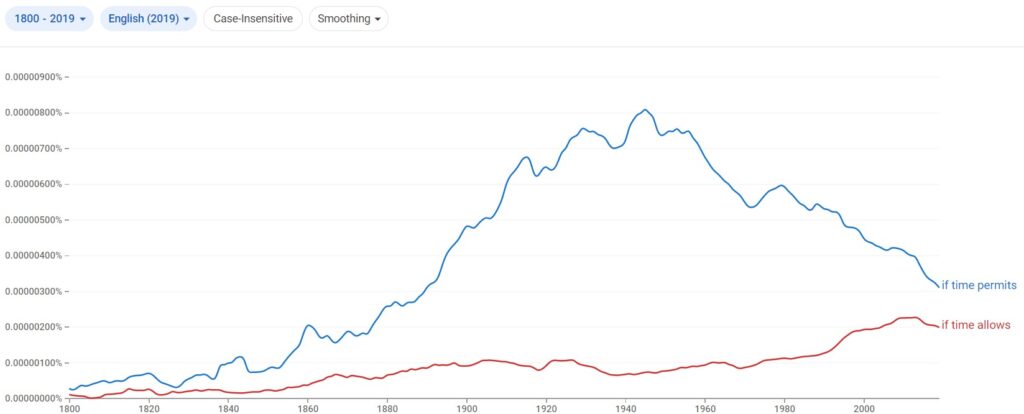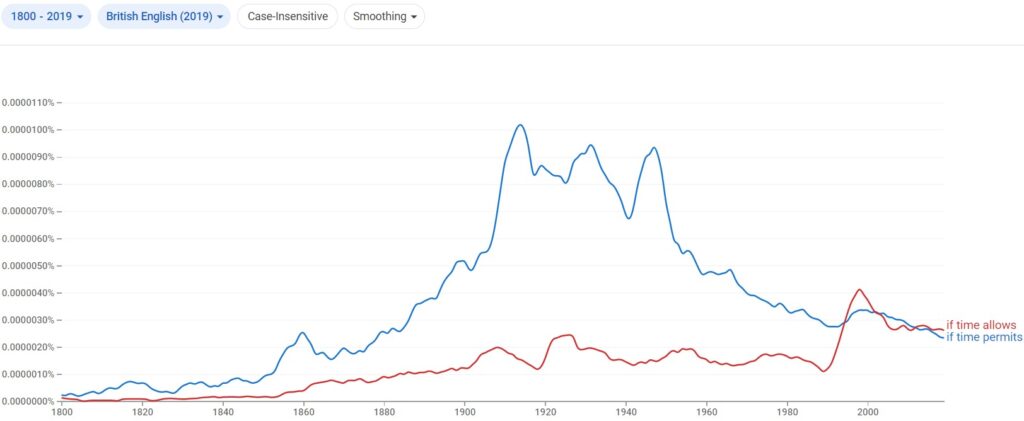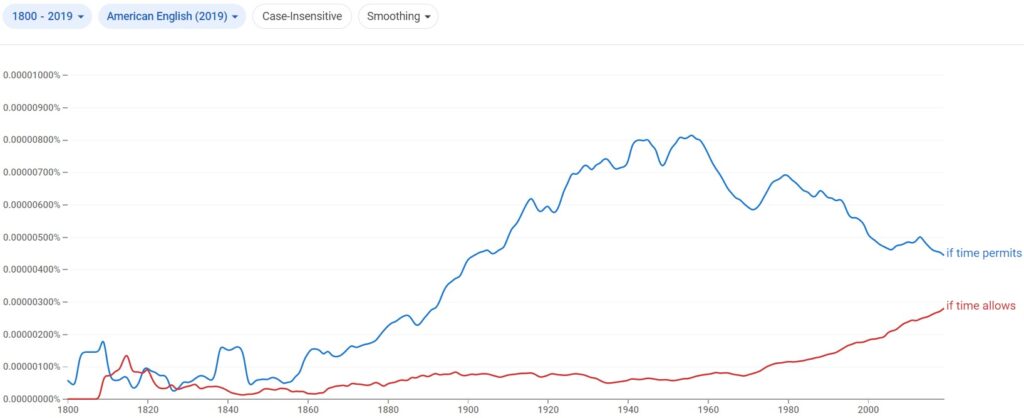Both the phrases “if time permits,” and “if time allows” have to do with requesting the use of someone’s time. This article explains the differences between the two. It also describes the appropriate usage for each expression and some synonyms that you can use to mean the same thing.
Is It “If Time Permits” Or “If Time Allows”?
Both the expressions “if time permits” and “if time allows” are suitable phrases that one can use to indicate that the completion of some activity depends on some restraint of time. They are both commonly used in the English Language and would be interpreted to mean the same thing.

What Does “If Time Permits” Mean?
The phrase “if time permits” refers to the completion of a secondary or optional activity. During a set period of time (i.e., an hour, a day, etc.) you will complete that secondary activity if you have already completed the main activity for which you originally set the time aside.
The Cambridge Dictionary defines “permit,” as “to allow something,” and “to make something possible.” Therefore, you can see that in this phrase, it is the amount of “time” left over that allows something else to be possible.
Examples Of How To Use “If Time Permits” In A Sentence
Here are some example sentences that show how to use the phrase “if time permits” in a proper sentence.
- If time permits after the presentation, I will answer the audience’s questions.
- While we are in Paris, we plan on traveling to the French countryside if time permits.
- If time permits we will try to walk one of the other trails after visiting the waterfall.
- You may check over your answers before you turn in the test if time permits.
- If time permits, we’d love to go back to that Italian restaurant before we go home.
- If time permits after the interview, I will give you a tour of the office.
See how in all of these examples, there is a specific period of time allotted. If the time expires before the secondary activity could be completed, it will not occur.
What Does “If Time Allows” Mean?
The phrase “if time allows” also means that you will complete a secondary or optional activity if you are able to after completing the primary activity for which you originally set aside the time. The only difference between this phrase and “if time permits” is a matter of style.
The definition of “allow” in The Cambridge Dictionary is “to let someone do something or let something happen; permit.” As you can see from the definition, the word “permit” is included which shows that the two phrases are synonyms for each other.
Examples Of How To Use “If Time Allows” In A Sentence
These example sentences show the phrase “if time allows” used in context. Note that the examples are quite similar to the ones given for “if time permits.”
- If time allows before our dinner reservation, I’d like to stop by the candy store.
- If time allows while you’re in town next week, I’d love for you to come and see me perform.
- If time allows after the test is over, I’d love to hear about everyone’s vacation.
- Let the roast sit and rest for 20 minutes if time allows, before carving and serving it.
- If time allows after we’re done talking about this project, we can start talking about the next one.
- If time allows before you have to pick up your son from school, stop by my apartment.
Are “If Time Permits” And “If Time Allows” Interchangeable?
Yes, the phrases “if time permits” and “if time allows” can be used interchangeably and have no significant differences in meaning that would suggest one use is more appropriate than the other. The choice of which one to use is a matter of personal preference and style.
You were able to see from the examples presented for both phrases that either of the expressions could be used in any of the sentences and they would all convey the same meaning.
“If time permits” may sound slightly more formal, but the implication is so subtle that it is barely noticeable.
Is “If Time Permits” Or “If Time Allows” Used The Most?
The phrase “if time permits” is used slightly more often than the phrase “if time allows.” However, in the modern English Language, both the expressions are regularly used and accepted.
The Google Ngram Viewer here shows that for a good portion of history, “if time permits,” was largely more popular than “if time allows.” However, in the last decade or so the gap has started to close, and now “if time permits” is only slightly more favored.

Are “If Time Permits” And “If Time Allows” Used Differently In The UK And The US?
In the UK, “if time permits” and “if time allows” are used at essentially the same rate and neither phrase shows preference over the other. In the US, the phrase “if time permits” is clearly more utilized than “if time allows.”
This Google Ngram Viewer shows the usage data for the UK. As you can see, for much of history, “if time permits” was the more used expression. However, in the early 1990s, both phrases started to be used similarly and this trend continues until today.

The data for the US appears in this Google Ngram Viewer. Here you see that “if time permits” gradually rose in popularity starting in the late-1800s. It peaked at about the mid-1950s. From there it started to trend downward, but it is still used more often to this day. However, the usage of “if time allows” continues to climb and the two may overlap in the near future.

“If Time Permits” And “If Time Allows” – Synonyms
Some phrases that you can use instead of “if time permits” and “if time allows” include the following:
- If you have the time
- Time permitting
- If there is time
- If we have time left
- If there’s time remaining
- If your schedule allows
- If your schedule permits
- If time doesn’t run out
You may also like: 10 Better Ways To Say “Thank You For Taking The Time”

Martin holds a Master’s degree in Finance and International Business. He has six years of experience in professional communication with clients, executives, and colleagues. Furthermore, he has teaching experience from Aarhus University. Martin has been featured as an expert in communication and teaching on Forbes and Shopify. Read more about Martin here.
